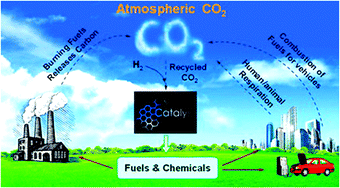Recently I blogged about the importance of green chemistry in process research and development. But making the things we need in a greener way is only one step in our journey to a more sustainable lifestyle. Dealing with the waste we produce is also crucial.

CO2 is an attractive building block for making organic chemicals and materials, says Gong, but currently its use is limited to a few industrial processes. It is thermodynamically stable so high energy substances or electroreductive processes are used to transform it into other chemicals.
The group discuss the steps scientists have taken to improve the hydrogenation of CO2, which can produce useful chemicals such as methanol, ethers, and hydrocarbons. They cover catalyst design, reactor optimisation and reaction mechanisms as well as the challenges and opportunities for future research in the field.
Read the review and let me know what you think by leaving a comment.










